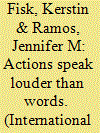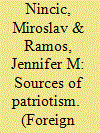| Srl | Item |
| 1 |
ID:
132358


|
|
|
|
|
| Publication |
2014.
|
| Summary/Abstract |
How and to what extent is the preventive use of force becoming the future of foreign policy for states around the world? We explore the spread of preventive logic to increasing numbers of states and examine the degree to which an international norm toward preventive self-defense is cascading in the international system. Through content and comparative case study analysis, we investigate leaders' rhetoric and security policies concerning what we theorize is the key indicator of a country's emulation of the United States: assertion of the right to the unilateral, preventive use of force outside of its borders. Our evidence indicates that there has been a shift away from the established international norm-which considers the use of preventive force illegal and illegitimate-toward growing acceptance of unilateral preventive strategies, a shift largely propelled by the precedents set by the United States in the war in Iraq and its use of unmanned aerial vehicles (UAVs or drones) in the global war on terror. Our findings also reveal that some states are applying the strategy of preventive self-defense beyond the use of UAVs for targeted killings to the extreme contingency plan for nuclear war. We conclude by discussing possibilities for further research and considering the implications of this phenomenon.
|
|
|
|
|
|
|
|
|
|
|
|
|
|
|
|
| 2 |
ID:
117849


|
|
|
|
|
| Publication |
2012.
|
| Summary/Abstract |
Patriotism, as attachment to country, is the value on which most foreign policy attitudes ultimately hinge, yet very little in the academic literature addresses the implications of the way in which the foundations for this attachment are conceived. Two variants of patriotism can be identified: one absolute, the other contingent. For those holding the latter conception, patriotism must be justified by one's country's actions: the greater the approval of one's country's policies, the greater the degree of patriotic attachment that is warranted. For those holding the former conception, patriotism is an absolute and a constant value, and it is reflected in support for one's country when the going gets tough. We seek to understand the circumstances that determine how critical or uncritical a patriot a person would be, given both specific conditions related to the individual and the international situation more generally. Moreover, we are interested in accounting for overall levels of patriotism. We use survey data from the PEW, as well as experimental data, to examine these matters. We find that factors internal to the individual, and not external conditions, determine the kind of patriot one is; at the same time, overall patriotism is found to be influenced by both internal and external circumstances.
|
|
|
|
|
|
|
|
|
|
|
|
|
|
|
|